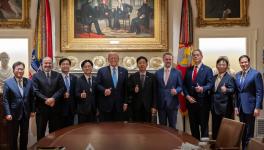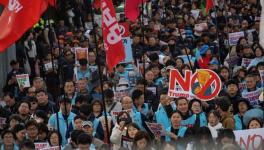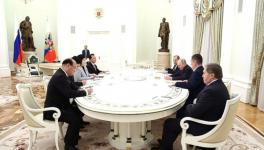South Korea Votes Oust Conservatives, Usher in Dialogue with North.
Author and journalist Suki Kim says South Korea's election of Moon Jae-in, ending a decade of conservative government, is a rejection of neoliberal policies at home and of U.S.-fueled tensions with the North.
Aaron Mate: (opening music)
It's The Real News. I'm Aaron Maté. Moon Jae-in has claimed a landslide victory in the South Korean presidential election. His win ends a decade of conservative government and comes months after the impeachment of Park Geun-hye. The vote could be a watershed moment. Moon favors engagement with North Korea and has vowed to tackle income inequality and high unemployment. Suki Kim is and author and journalist. She joins me now. Suki, welcome.
SUKI KIM: Hello. Thank you for having me.
AARON MATE: Hi. So from what we've seen, turnout in this election was the highest in South Korea in 20 years. What do you think explains that and how significant do you think this result is?
SUKI KIM: I mean, it comes on the heels of the former present, Park Geun-hye, who was impeached last December and then removed from office in March. And that happened as a result of five months of nonstop protest. Actually, the main protest that brought that about was about 45 days of nonstop, millions of people coming out into the streets of Seoul. So with that much passion, in some sense, and that rage toward the last regieme, really administration, that was so corrupt, there is this overwhelming excitement for his reign and he's the opposite of the former president in every way.
AARON MATE: What kinds of reforms are people expecting from Moon after this huge protest movement, as you say, ousted Park Geun-hye?
SUKI KIM: Moon Jae-in is, when I say the opposite, it couldn't be any more different. He's a human rights attorney, he's the left party, he was also jailed by her father literally. Her father was a former dictator president, Park Chung-hee. And Moon Jae-in, the current, newly elected president was actually jailed opposing that government. So, what he represents for people is, he's going to stand up to the elite and he's going to also be more engaging with North Korea. He's going to stand up to chaebol, which is the big companies like Samsung and Hyundai, which dominate Korean economy. He's going to take corruption out of those big corporations. These are his promises. So there is definitely hope and excitement for what will happen then.
AARON MATE: You mentioned these big family dominated corporations that are such are critical part of the South Korean economy, can you explain a bit more about what is behind the discontent towards them? I know they played a pretty major role in the corruption scandal involving Park Geun-hye.
SUKI KIM: Right now, Park Geun-hye is in jail, waiting for her trail to begin. So is the head the Samsung. So there is a sense in people; he's in jail because he was trying to influence government policies in favor of Samsung by bribing the government. So, that kind of deep rooted corruption was always in South Korean politics and the forefront of that is really Park Geun-hye's father, who ruled South Korea from about 1961-62 until he died in 79. That sort to fundamental corruption is what Moon Jae-in currently is promising, the platform on which that he won the election, the sweeping victory is that his promise to the nation is that he is going to rule out that sort of corruption.
AARON MATE: Now, let's talk about the role of the U.S. in this election. Of course, right now we have high tensions between the U.S. and North Korea. And right before the vote, the U.S. activated the THAAD, this missile system inside South Korea. And you wrote a really interesting piece for Foreign Policy. It was called "South Korea Is More Worried About Donald Trump Than Kim Jong Un". What did you mean by that?
SUKI KIM: Well, we've seen rapid negativity coming form the United States towards South Korea, of course North Korea too, but sort of separately, in the last month of April, which began with Trump declaring South Korea, having been a former Chinese colony, which is incorrect, which is very dismissive towards Koreans. It's the sort of thing Koreans won't forget. It's a major faux pas. And following that was of course, he suddenly decided that South Korea should pay a billion dollars for THAAD, which the United States government had already agreed to pay for. And then he threatened to end the free-trade agreement with South Korea and end the alliance.
So I think that each of these threats has came so suddenly, unexpected, and days before the election, there is definitely a sense where South Korea, which is an American ally, is suddenly America's not trustworthy and also it's very disruptive and incredibly disrespectful to another country's election time. With about week to go, Trump keeps saying these things that are suddenly shaking the entire country. So that is definitely hurting the relationship. And of course the preemptive strikes against North Korea is a completely, in a way, separate thing, because South Korea is dealing with it's own internal, domestic issues and having to deal with American threats constantly. And in a parallel way, there's a fight with North Korea. And these two are not melding, used to be a triangular relationship where South Korea and North Korea and the United States used kind of one problem, but not in this new American administration.
I think that there's defiantly a sense, we know what Moon Jae-in is gonna do with North Korea because his policy is almost miraculously similar to a former president, Roh Moo-hyun, who was very very very positive towards North Korea's Sunshine Policy which is a policy of engagement. And Moon Jae-in, the new president elect, basically worked for, he was a chief of staff for Roh moo-hyun. So he pretty much has the same policy, so we know what to expect. What we don't know is really what is going to happen between Moon Jae-in and Trump because Moon Jae-in is a guy who's promising to people he's gonna stand up to a big bully, like big corporation; right not the bully is also the United States. So, then how he's going to stand up to the United States and yet, at the same time, have enough of a positive diplomatic relation. Because, obviously, South Korea has to get along with the United States which Moon Jae-in said he's going try, but it's kind of difficult to promise to stand up to the bully while getting along with that bully. And that is kind of what Moon Jae-in has to do.
AARON MATE: I also imagine it's a challenge for Moon Jae-in to stand up to Trump when he has 25 thousand U.S. troops inside his country.
SUKI KIM: Well, that problem's always been there. It's a sore issue, the problem of American troops in South Korea. What are the doing there? Are they actually there to help South Korean democracy or are they there to escalate tension? I think that is a thing that kind of has a double-edged attitude towards that among South Koreans. And because, what Trump's been stewing and saying every few weeks in general have been surprising, but towards South Korea has really been a surprise. Because generally, that sort of language would be reserved for North Korea. But what was happening, recently, right before the election was that one after another insults towards South Korea came. That's the element that we don't really know what to expect, because we know what to expect with North Korea.
AARON MATE: Finally, Suki, as we wrap up, you spend time, both in South Korea and also here, in the U.S., what's it like to observe the way the Koreas are covered here in the U.S. as someone who is from there and knows the country very well? Living here in the U.S., how do you observe the discourse about North Korea and South Korea in the United States?
SUKI KIM: I think in the United States, generally, obviously, about North Korea the dialogue is incredibly misleading and often misinformed. That's because North Korea is a difficult subject. It's a country I went under cover in and covered extensively. So, I think that America simply does not understand North Korea at all.
When it comes to South Korea, I think that we are a lot clearer what the dynamic is between North and South, but I mean, one of the fundamental issues, I would tell you, if you asked average Americans, "What do you think about the troops in South Korea? Why is there any anti-American sentiment possibly from South Korea toward the United States at some point? You know there had been in the past." Nobody would really be able to answer that. Like what are they doing in South Korea? The troops that's been there since 1953. I think that that dialogue where, actually, America was responsible, along with the allies, the division of Korea is a dialogue that America simply chose to forget that detail entirely. It only talks about going to Korea to help them by free democracy. Never talks about actually dividing the country happened back 1945.
So, I think that there is a lot of hypocrisy in discussion with South Korea. However, it is an ally and I think that why Trump has been saying all these things towards South Korea that has been so negative in the past month. I think it is something that we do kind of have to try to look at because the relationship the U.S. has with North Korea, which is a very very scary one, because North Korea's a nuclear country. And the country that really has to kind of negotiate that very difficult dynamic between the United States and North Korea is actually South Korea. So the relationship that America has to have with North and South are both incredibly important. I don't think we really understand that in America.
AARON MATE: Suki Kim, author and journalist, thanks so much for joining us.
SUKI KIM: Thank you.
AARON MATE: And thank you for joining us on The Real News.
Get the latest reports & analysis with people's perspective on Protests, movements & deep analytical videos, discussions of the current affairs in your Telegram app. Subscribe to NewsClick's Telegram channel & get Real-Time updates on stories, as they get published on our website.
























